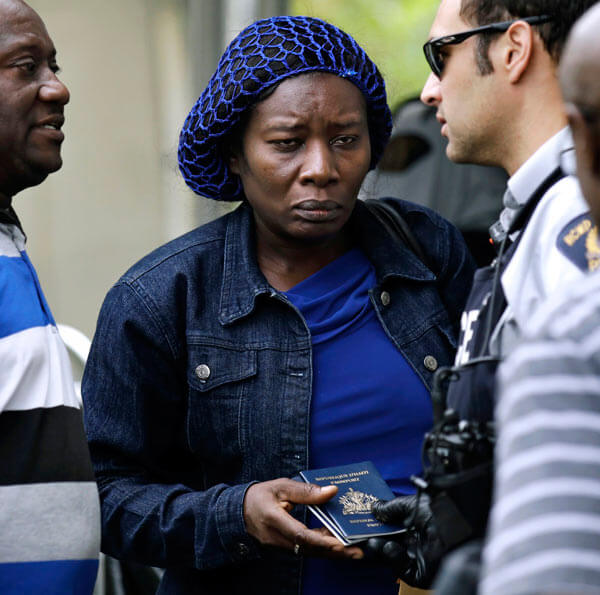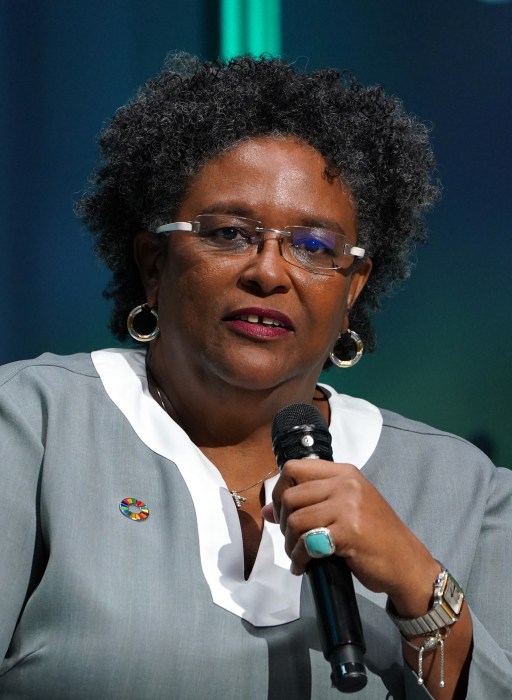While United States President Donald J. Trump is clamping down on illegal immigration, thousands of Haitians with Temporary Protected Status (TPS) in the United States are rushing to the border crossing in Champlain, upstate New York, willing to face arrest in their pursuit of a better life, according to reports here.
The popular stop near the border station at Lacolle, Quebec, Canada is quickly becoming a path to a new life for immigrants — and something of a tourist attraction, reported the Miami Herald.
It said the migrant surge has overwhelmed Canadian officials who, after opening Olympic Stadium in Montreal to asylum seekers, recently reopened a shuttered hospital to accommodate the growing numbers, and deployed the military to construct a tent city near the official border crossing at St. Bernard-de-Lacolle.
The refugees have decided that getting arrested with an uncertain future in Canada is better than risking deportation under Trump, the Herald said.
Responding to the influx of refugees in his province, Quebec’s Prime Minister Philippe Couillard told the Canadian press that “it’s unfortunate” that asylum seekers have been led to believe that being admitted into Canada was “a done deal.”
He and other officials stressed that, despite the warm reception and treatment refugees have received, there is an immigration process, adding that arriving migrants will have to demonstrate why they should not be returned to their home countries, according to the Herald.
“We have the notion here people are being told, ‘Go to Canada, it’s welcoming. Just walk right in, the streets are paved gold and get a job,’” said Paul Clarke, the executive director of Action Réfugiés Montréal, which works with refugees seeking asylum in Canada.
“But it’s not like that,” he added. “People have to make a refugee claim. They have to state why they are being persecuted or fear persecution in their home country for their race, religion.
“The statistics in Canada for the last couple of years show that only 50 percent of Haitians meet that test,” Clarke continued. “Only 50 percent are accepted as refugees in Canada. But we kind of get the sense that’s not what’s being told in the States.”
While the wave of Haitians crossing into Canada has been fueled by fears that the United States will send them back to Haiti early next year, when Haiti’s TPS is set to end, the community has been bombarded with misleading and false messages on WhatsApp, social media and Creole-language radio saying that Canada is offering free residency, the Herald said.
The paper said that, in one message, a man claiming to be an attorney says the Canadian Consul in the United States is inviting “and even encourages all Haitians with or without TPS to apply for Canadian residency.”
More than 6,500 asylum-seekers have crossed into Quebec province since the beginning of the year, and most estimates say about half are Haitians, according to the Herald.
“Right now, the question is how can the governments, the municipal, the provincial government of Quebec and federal in Ottawa manage this?” said Donald Cuccioletta, a historian and senior research associate at the Université du Québec à Montréal’s Raoul Dandurand Center for Strategic and Diplomatic Studies. “It’s approaching a crisis. How do we handle these people once they come across?”
The steady stream of Haitian migrants began in May when the Trump administration announced it was granting Haitians living in the United States only six months extension on their TPS — awarded after the 2010 earthquake that devastated Haiti — which would mean the status would end in January, the Herald said.
In July, when the 180-day countdown for January began, the flow of people picked up again, it said.
Migrant families are told they will be arrested by the Royal Canadian Mounted Police before crossing the United States to Canada at the border along Roxham Road, the Herald said.
It said thousands of people have crossed over into Canada from an irregular crossing near the Champlain–St. Bernard de Lacolle border in hopes of finding residency in Canada.
Among them are Haitians who worry that TPS in the US could soon end under the Trump administration, the Herald said.



























